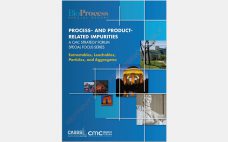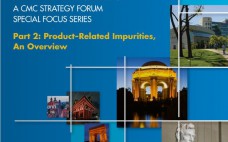Part 1 of this article focused on the first two sessions of a CASSS chemistry, manufacturing, and controls (CMC) forum entitled “Next-Generation Biotechnology Product Development, Manufacturing, and Control Strategies,” which took place on 16–17 July 2018 in Gaithersburg, MD. Those sessions focused on upstream and downstream process technologies and strategies (1). Part 2 highlights the final two conference sessions on process modeling, control, and analytics. Process Modeling and Control The third conference session was “Modeling and Control Strategies.” Advancements in…
Author Archives: Anthony Mire-Sluis
Next-Generation Biotechnology Product Development, Manufacturing, and Control Strategies, Part 1: Upstream and Downstream Strategies
Future biomanufacturing must address industry drivers, including the need for decreasing cost of goods (CoG), increasing market globalization, shortening development time for pipeline products, reducing risk to patient supply, and improving product quality. A CASSS chemistry, manufacturing, and controls (CMC) forum entitled “Next-Generation Biotechnology Product Development, Manufacturing, and Control Strategies” took place on 16–17 July 2018 in Gaithersburg, MD, to address those opportunities. Advanced technologies include single-use bioreactors, alternating tangential-flow (ATF) systems used during fermentation, modular and closed process equipment,…
Development of Patient-Focused Commercial Specifications: Understanding Clinical Relevance and Criticality of Quality Attributes
The CASSS chemistry, manufacturing, and controls (CMC) Strategy Forum on 23 January 2019 in Washington, DC, was entitled, “The Development of Patient-Focused Commercial Specifications Through Understanding of Clinical Relevance and Criticality of Quality Attributes.” This forum covered the definition, identification, control, and management of patient-focused attributes throughout the life cycle (from discovery through approval) of biological products, including vaccines. Participants investigated how to differentiate through the product development life cycle which attributes are “clinically meaningful” from those applied for manufacturing…
Special Report on Process- and Product-Related Impurities (A CMC Strategy Forum Special Focus Series): Extractables, Leachables, Particles, and Aggregates
The CMC Strategy Forums focus on relevant chemistry, manufacturing, and controls (CMC) issues throughout the life cycle of a therapeutic and thereby foster collaborative technical and regulatory interaction. Forum chairs share information with regulatory agencies to help them merge good scientific and regulatory practices. Outcomes of forum meetings are published in BioProcess International and on the CASSS website (www.casss.org). This process is meant to help ensure that biopharmaceutical products manufactured with advancing technologies in a regulated environment will continue to…
CMC Strategy Forum Special Focus Series: Part 2 Product-Related Impurities, An Overview
Introduction by Cheryl Scott The CMC Strategy Forums focus on relevant chemistry, manufacturing, and controls (CMC) issues throughout the life cycle of a therapeutic and thereby foster collaborative technical and regulatory interaction. Forum chairs share information with regulatory agencies to help them merge good scientific and regulatory practices. Outcomes of forum meetings are published in BioProcess International and on the CASSS website. This process is meant to help ensure that biopharmaceutical products manufactured with advancing technologies in a regulated environment…
Effective Management of Contract Organizations: Keeping the Product Pipeline Moving, Compliant, and Available
Both small and large biopharmaceutical companies are increasingly pursuing the outsourcing of manufacturing and testing throughout the product lifecycle. The growing use of contract manufacturing organizations (CMOs) and contract testing organizations (CTOs) has led to increasing complexity within the biopharmaceutical industry as more third-party sites are leveraged to support global markets. To address those issues, a CASSS Chemistry, Manufacturing, and Controls (CMC) Strategy Forum was held in Washington, DC, 27–28 July 2014. The title was “Effective Management of Contract Organizations: Sponsors, Contract Organizations, Health Authorities and Patients — Keeping the Product Pipeline Moving, Compliant, and Available.” The CMC Strategy Forum is…
Analysis and Structure Characterization of Monoclonal Antibodies
On 6 January 2003, 129 attendees participated in the second Well-Characterized Biotechnology Product (WCBP) Chemistry and Manufacturing Controls (CMC) strategy forum, titled “Analysis and Structure Characterization of Monoclonal Antibodies (MAbs),” held in San Francisco to discuss lot release and characterization test issues specific to MAbs (1). The objective of the meeting was twofold: to identify a “core” set of assays most useful for lot-release testing of MAbs and to define a mechanism for selecting appropriate potency tests. Two separate workshops…
Lot Release and Characterization Testing of Live-Virus–Based Vaccines and Gene Therapy Products
The January 2005 CMC Strategy Forum was devoted to a discussion of live virus vaccines and viral vectors used for gene therapy. The purpose of the meeting was to determine whether consensus positions could be reached among the delegates regarding lot release, stability, characterization, and comparability testing. Part 1 of this two-part report on that meeting describes factors influencing the choices of lot-release assays for vaccines and gene-therapy products (1). Part 2 presents potency testing, characterization, and comparability studies, including…
Accelerated Product Development: Leveraging Industry and Regulator Knowledge to Bring Products to Patients Quickly
A Chemistry, Manufacturing and Controls (CMC) Strategy Forum titled “Accelerated Product Development: Leveraging Combined Industry and Regulator Knowledge to Bring Products to Patients More Quickly” was held in Washington, DC, on 27 January 2014. Biological therapeutics in development are demonstrating remarkable results in the clinic for many indications. So companies are seeking ways to accelerate the approval of these therapies and rapidly bring them to market. Many such products take the form of well-characterized proteins (e.g., IgG1 or IgG2 monoclonal…







